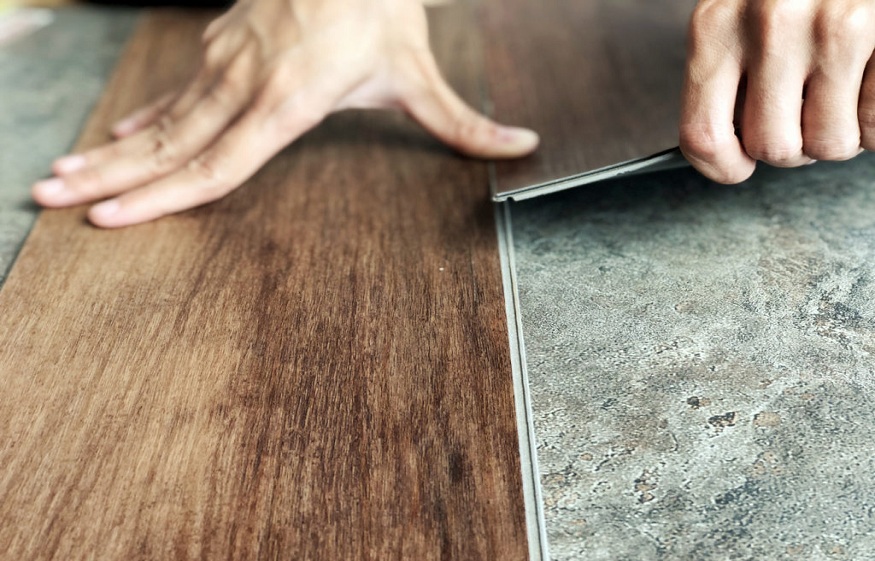Twenty-four hours are enough to have an idyllic apartment and a completely renovated space. Well, with the help of vinyl floors, you can design a room from scratch and enjoy it in a short time, without much mess and without spending more.
Among the advantages offered by vinyl floors, we can highlight that they have a wide range of designs, colours and styles that, although they make decision-making more complex, allow you to open up to countless creative possibilities. Each has characteristics that will enable them to better adapt to certain types of areas, and one of them is the format.
There are situations in which the colour and texture of the floor cease to be relevant, and it is the format that becomes fundamental during remodelling since the pattern designed in each room depends on it.
Vinyl floors can be found in different formats: in roll, square tiles or planks, which we will call “pieces”. These presentations help each bed cover specific needs and, therefore, determine their use. Since as we have mentioned in previous articles, it is impossible to use the same type of flooring in an operating room as in a kindergarten or terrace.
So that you are clear about which vinyl flooring you can install in your remodelling, here are some differences between vinyl flooring in roll and pieces.
Roll vinyl flooring:
Sheet vinyl flooring marked the beginning of vinyl flooring, and during the 1970s, it was very much in vogue. However, it presented a problem at the time of installation since, yes or yes, the base floor was required to be in perfect condition, meaning that it had to be reformed in the event of damage. When installing a rolling floor on a deteriorated floor, even the smallest detail is highlighted.
- This is the most economical and essential presentation of vinyl floors.
- Its production is in a roll, as its name indicates, usually 2 m wide by 30 m long.
- The thickness varies between 1.5 mm and 3.5 mm, so it can quickly adapt to different needs.
- This type of flooring is ideal for installation in large, high-traffic spaces, where it is not essential to make many cuts or adjustments to the material.
- They are offered in a wide variety of stylish wood, tile or marble designs.
- Its installation is simple and fast, but it requires that the original floor is clean, without the presence of dust or grease. In addition, it must be completely smooth, free of pores and flaws, and preferably level to ensure good adherence and acceptance of the adhesive.
- After applying the glue, it is necessary to wait about 20 minutes to install the sheet vinyl and at least 12 hours for it to dry completely and be ready for use.
- Its most common use is in locations in the educational and hospital sectors.
- When a section of the floor deteriorates or is damaged, it must be removed entirely since fixing only a part implies doing extremely detailed work and using pieces of the same colour and texture as the original roll. A complicated task when time has passed.
Vinyl floor in pieces:
This vinyl flooring option was born due to the need to replace only a portion of the floor due to damage or deterioration with roll flooring. This was a highly complex task. Initially, tiles that had to be glued together appeared, but over time, and thanks to technological developments, the click system on slats was also introduced, which allows individual pieces to be assembled or removed in a more straightforward way, similar to a puzzle.
- Unlike sheet vinyl flooring, this one has more detail and time to install.
- Well, this process must be done piece by piece and, usually, in smaller spaces and with more nooks and crannies, requiring more significant detail.
- Installing errors are easier to correct since only the damaged part is removed and replaced or repositioned, which is impossible with roll flooring.
- It’s easier to create custom patterns during installation if you use tiles or planks of the same size and characteristics.
- Another advantage of using vinyl tiles is that, by using the click-type system, installation is greatly simplified, and the use of adhesives is unnecessary.
- When a tile is damaged, it can be easily replaced; however, it is necessary to consider the colour and batch of the initially installed tiles so as not to leave patches.
- Vinyl tile and plank come in various colours and textures, some higher-end than others.
Before installing a vinyl floor, or any other material, keep in mind the needs that must be covered in the space to be remodelled, check the dimensions of each room and make sure you find a floor that suits your decoration style.

